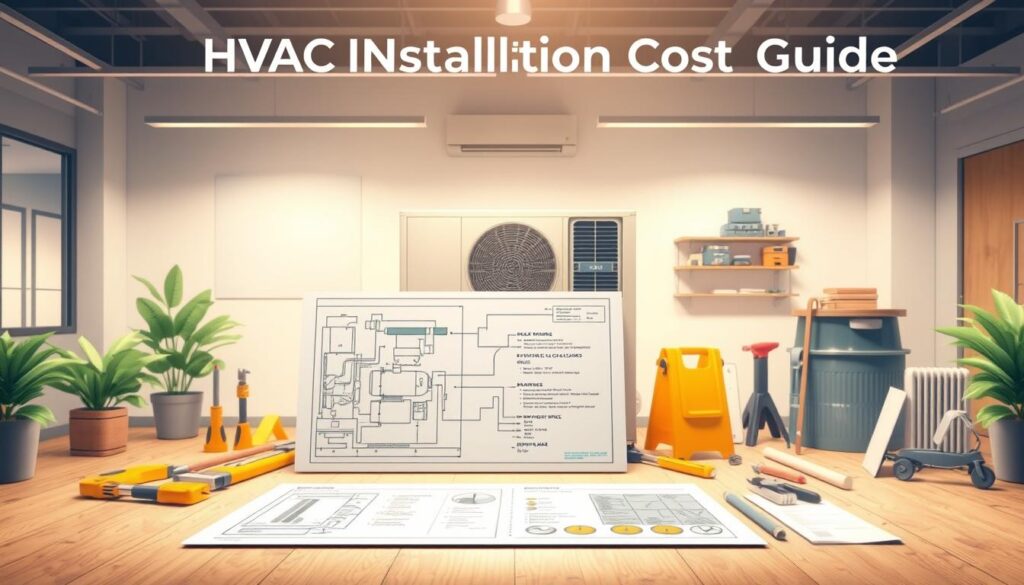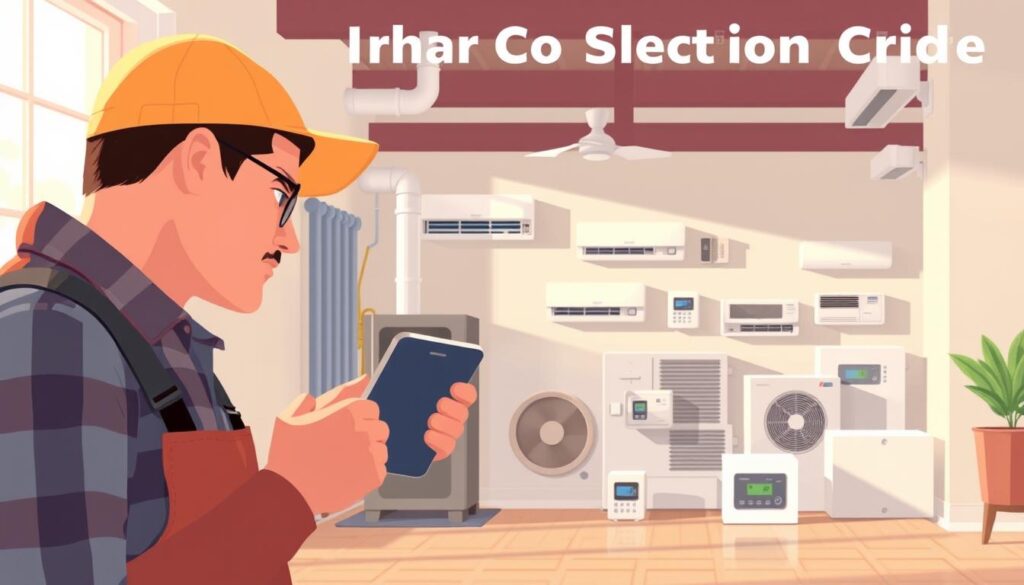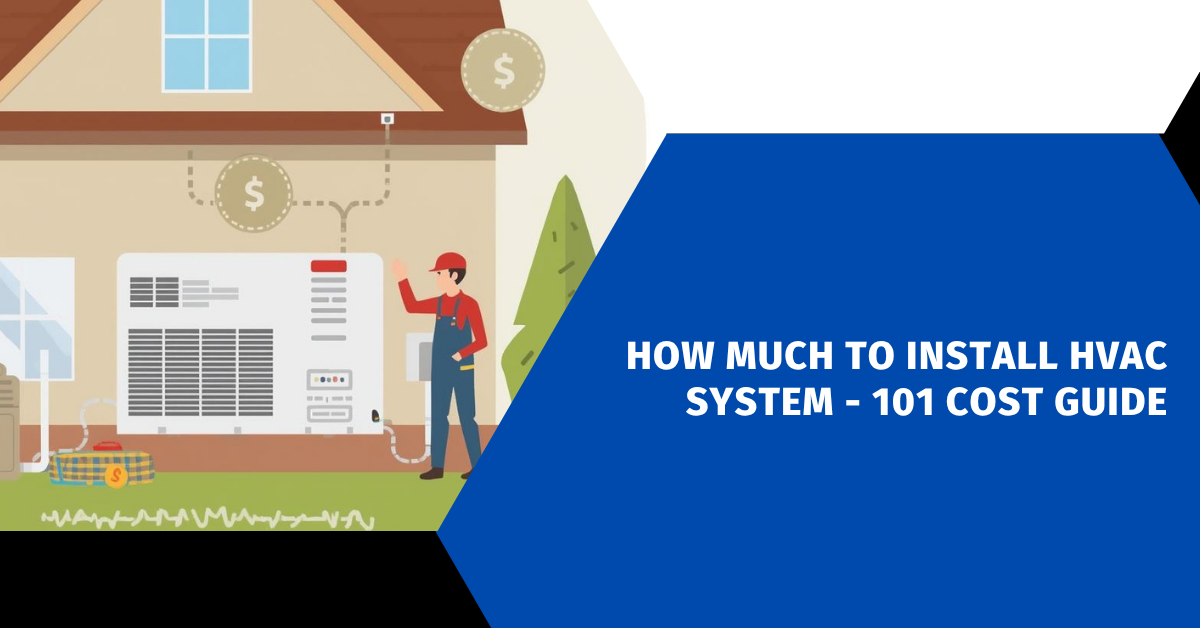Affiliate Disclosure
HVAC Guide Guys is a participant in the Amazon Services LLC Associates Program, an affiliate advertising program designed to provide a means for sites to earn advertising fees by advertising and linking to Amazon.
How Much to Install HVAC System? Are you curious about the cost of a new HVAC system for your home? Figuring out hvac installation costs can seem like a puzzle. There are many prices and choices to consider.

Getting a good HVAC system is more than just controlling the temperature. Forbes says central air conditioning costs between $2,900 and $9,000, with an average of $5,850. This big range shows why you need a detailed guide to know the cost of an HVAC system.
Your home’s comfort, energy use, and savings depend on a smart choice. This guide will cover all you need to know about HVAC system installation. It will help you plan your budget and make sure you’re making the right decision.
Key Takeaways
- Average HVAC installation costs range from $2,900 to $9,000
- Multiple factors influence total installation expenses
- Professional installation ensures optimal system performance
- Energy efficiency can offset initial investment costs
- Proper sizing is key for a good HVAC system
Table of Contents
Understanding HVAC System Installation Basics
When you think about getting a new HVAC system for your home, it’s important to know the basics. Your comfort depends on picking the right system that fits your needs and budget.
Today’s HVAC systems are complex. They have heating, cooling, and ventilation parts to make your home comfortable. The cost of installing central air varies based on the system type and your home’s size.
Types of HVAC Systems Available
There are many HVAC systems you can choose from:
- Split Systems: Traditional setup with indoor and outdoor units
- Packaged Systems: Compact units with all components in one location
- Ductless Mini-Split Systems: Flexible solutions for targeted cooling
- Heat Pump Systems: Efficient heating and cooling in one unit
Key Components of an HVAC System
Knowing the main parts of an HVAC system helps you make better choices:
| Component | Function | Typical Lifespan |
|---|---|---|
| Compressor | Circulates refrigerant | 10-15 years |
| Condenser | Releases heat outside | 15-20 years |
| Evaporator Coil | Absorbs indoor heat | 10-15 years |
| Thermostat | Controls temperature | 10-15 years |
Professional vs DIY Installation Considerations
While DIY might save money, hiring a pro has big benefits:
- Precise system sizing
- Proper equipment handling
- Warranty protection
- Complex electrical and refrigerant management
Professional technicians ensure your central air conditioning installation price reflects quality workmanship and long-term performance.
Explore Our HVAC Shop
Looking for top-rated HVAC tools, parts, and accessories? Visit our shop and find the perfect solution for your needs.
Visit the ShopAverage HVAC Installation Costs by Home Size
The cost of a new furnace depends on your home’s size. The bigger your home, the more you’ll pay for heating and cooling.
Choosing the right HVAC system is key. Smaller homes need less powerful systems. But bigger homes need stronger ones.
| Home Size (sq ft) | HVAC System Capacity | Estimated Cost Range |
|---|---|---|
| 750-900 | 1.5 ton | $2,500 – $4,500 |
| 1,000-1,500 | 2 ton | $3,200 – $5,000 |
| 2,000-2,500 | 4 ton | $3,800 – $6,000 |
| 2,500-3,000 | 5 ton | $4,300 – $6,800 |
Several things affect the cost of your heating and cooling system:
- Home square footage
- System efficiency rating
- Local climate conditions
- Existing ductwork infrastructure
Your exact costs will depend on these factors. Getting a professional to assess your home is essential. They can find the most cost-effective solution for you.
Pro tip: Always request multiple quotes to ensure you’re getting the best value for your HVAC investment.
Explore Our HVAC Shop
Looking for top-rated HVAC tools, parts, and accessories? Visit our shop and find the perfect solution for your needs.
Visit the ShopHow Much to Install HVAC System: Complete Cost Breakdown
Understanding the total cost of an HVAC system installation is key. It involves looking at different cost parts. When planning your HVAC replacement, consider many factors that affect the total cost.
Professional HVAC installations have several main cost areas. Knowing these can help you budget better. It also helps when getting quotes from HVAC contractors.
Equipment Costs and Materials
The main costs of your HVAC installation are:
- HVAC unit pricing
- Necessary ductwork components
- Additional system accessories
- Specialized installation materials
Prices can change a lot based on your home’s needs and the system’s complexity. Energy-efficient models cost more at first but save money in the long run.
Labor and Installation Fees
Labor costs are a big part of your HVAC installation budget. Technicians charge based on:
- Installation complexity
- System type and size
- Contractor’s experience level
- Regional labor rates
Additional Installation Requirements
You might also face extra costs like:
- Electrical system upgrades
- Structural modifications
- Permit and inspection fees
- Removal of old HVAC equipment
Always ask for detailed estimates from different HVAC contractors. This ensures you get a fair and complete quote for your needs.
Factors Affecting HVAC Installation Pricing

Knowing what affects your HVAC installation cost can help you save money. Many factors influence the price of your new system. Each installation is unique, based on your home’s specific needs.
The size and layout of your home are key in determining costs. Bigger homes need more powerful systems, which raises the cost. Contractors will look at your home’s size, ceiling height, and layout to suggest the best HVAC system.
- Home Size: Larger spaces need more powerful and expensive units
- Climate Conditions: Local weather impacts system requirements
- Home Age: Older homes may need additional infrastructure updates
Your local climate greatly affects the HVAC system you’ll need. Areas with extreme weather need stronger systems, which can raise costs. Humidity, temperature, and seasonal changes also influence system choice.
The efficiency rating of your system is another important factor. More efficient units cost more at first but save money in the long run. When looking for an affordable HVAC, weigh the upfront cost against future savings.
- Efficiency ratings impact initial and long-term costs
- Brand selection influences pricing
- Seasonal market conditions can affect installation expenses
What your home already has also affects costs. Older homes might need new ductwork, electrical work, or structural changes. A professional can tell you about any extra costs before you start.
Explore Our HVAC Shop
Looking for top-rated HVAC tools, parts, and accessories? Visit our shop and find the perfect solution for your needs.
Visit the ShopHidden Costs and Additional Expenses
When planning your HVAC installation, it’s key to know about hidden costs. The price for central air conditioning can go up quickly. This is because of extra expenses that many people don’t think about.
- Permit and inspection fees required by local authorities
- Potential ductwork modifications
- Electrical system upgrades
- Structural modifications
Permit and Inspection Fees
Local areas usually need permits for HVAC installations. These fees can be from $100 to $500. A professional contractor can guide you through these steps and make sure everything is done right.
Ductwork Modifications
Older homes might need new ductwork for a new HVAC system. Duct sealing, repair, or complete replacement can cost $500 to $3,000. A home check can show if ductwork changes are needed.
Electrical Updates Required
Modern HVAC systems might need electrical upgrades. This could mean new circuits or a new electrical panel. Electrical work can cost $500 to $2,000, based on your home’s electrical setup.
“Always budget an extra 10-15% for unexpected HVAC installation expenses to avoid financial surprises.”
Knowing about these hidden costs helps you plan better. It keeps you from facing unexpected money problems during your HVAC installation.
Energy Efficiency and Long-term Savings
When you think about getting a new HVAC system, knowing about energy efficiency is key. Modern systems save you money over time with their smart tech and design.
Energy ratings are important for saving money. The SEER2 rating shows how well a system works. A higher SEER2 means better cooling and less electricity use.
- Switching to a new, efficient heat pump can cut energy costs by up to 20%
- New furnaces can lower heating bills by about 15%
- Programmable thermostats can save even more energy
Getting a new, efficient HVAC system might cost more upfront. But, smart upgrades can pay off big time. You’ll save on bills and help the planet too.
| HVAC Component | Potential Energy Savings | Average Lifespan |
|---|---|---|
| High-Efficiency Heat Pump | 15-20% | 10-15 years |
| Modern Furnace | 10-15% | 15-20 years |
| Smart Thermostat | 10-12% | 7-10 years |
Your new HVAC system is a chance to make your home comfy and save money. Talking to HVAC experts can help you find the best, most cost-saving options for your home.
Professional Installation Process Timeline
When you plan an affordable HVAC installation, knowing the process is key. Most hvac contractor quotes give a detailed timeline. This timeline shows the whole installation journey.
Professional HVAC installations have a set plan. This plan aims to cause little disruption and ensure your system works well. Knowing what to expect helps you plan and feel confident about your new heating and cooling system.
Pre-installation Assessment
The first step is a detailed check of your home’s needs. Technicians will:
- Measure your home’s square footage
- Assess current ductwork condition
- Evaluate existing electrical infrastructure
- Recommend the most suitable HVAC system
Installation Day Procedures
On installation day, skilled professionals will replace your old system. The steps include:
- Removing old HVAC equipment
- Preparing the installation area
- Installing new system components
- Connecting electrical and ductwork
Post-installation Testing
After installation, technicians test your new system thoroughly. Comprehensive quality checks ensure your affordable HVAC installation meets all standards.
Most central air conditioner installations can be finished in four to eight hours by experienced professionals.
Explore Our HVAC Shop
Looking for top-rated HVAC tools, parts, and accessories? Visit our shop and find the perfect solution for your needs.
Visit the ShopChoosing the Right HVAC Contractor

Finding the right HVAC contractor is key to your new furnace installation costs and system performance. Your choice affects the quality, efficiency, and life of your heating and cooling system.
When looking at HVAC contractors, focus on these important qualifications:
- State licensing and professional certifications
- Minimum 5 years of professional installation experience
- Manufacturer-authorized installation credentials
- Comprehensive insurance coverage
- Positive local reputation and verified customer reviews
The cost of your HVAC installation can change a lot based on the contractor’s skill. Look for professionals who give clear, detailed quotes and explain the installation process well.
Key steps to find the right contractor include:
- Request multiple written estimates
- Check online reviews and local references
- Verify insurance and licensing status
- Ask about warranty and post-installation support
- Evaluate communication and professionalism
Pro tip: Local contractors often provide more personalized service and faster response times compared to national chains.
Always prioritize quality and expertise over the lowest price when selecting an HVAC installation professional.
By carefully checking out contractors, you’ll get a smooth, efficient HVAC system installation. It will meet your home’s specific heating and cooling needs.
Conclusion
Figuring out the cost to install an HVAC system needs careful research and planning. The price can change a lot based on things like your home’s size, the system’s efficiency, and how hard it is to install. A 2-ton HVAC system usually costs between $3,200 and $7,800. High-efficiency models might cost up to $7,000.
Your HVAC investment is more than just the initial cost. Energy-efficient systems can save you money over time by lowering your utility bills and making your home more comfortable. Getting it installed by a pro ensures it works well, avoiding expensive fixes later and making it last longer. Think about the long-term benefits when choosing your HVAC system.
Getting quotes from trusted HVAC contractors is key. Every home is different, so getting a custom quote is important. Look for quality, efficiency, and professional installation to get the most out of your money. By choosing wisely, you’ll make your home comfortable and keep costs in check.
Remember, your HVAC system is a big investment in your home. With careful planning, expert advice, and focusing on long-term efficiency, you can make a smart choice. This choice balances the upfront cost with future savings and comfort.

